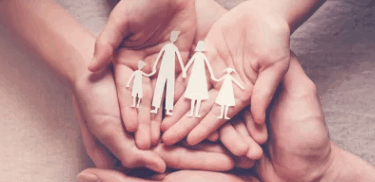Spring is here! The birds are chirping, the bees are buzzing, and the sun is shining brightly through your windows, which are, of course, smudged by greasy little hand prints and wet dog noses. Your thoughts jump to spring cleaning. But you didn’t make all these messes, why should you have to clean them solo? You don’t. Delegate some chores to the kids!
Getting your children to help around the house doesn’t have to be a chore in and of itself. Check out these expert tips from Clinical Psychologist at Cincinnati Children’s Hospital, Amie Duncan, Ph.D., and success stories from been-there-done-that parents.
Start Young
I always feel like I have little shadows when I clean. My 4- and 2-year-olds love to help out … or at least try. They’re able to do many tasks I assign them, including wiping off door handles (goodbye germs!) or helping me change out the laundry. I have treasured videos of my kids pushing the vacuum around, even though it is taller than them!
Youngsters really can assist with most basic tasks such as dusting, watering plants or feeding the family dog. And toy messes? Keep it lighthearted and fun by setting a timer and challenging your kiddo to clean up in less than five minutes or have a dunk-off where you toss toys in a basket. The most important thing is to make clean-up a natural part of young children’s routines.
The best way to motivate a young child is to verbally praise him! Duncan emphasizes that young children excel when they receive positive feedback. “Little kids don’t need a dollar to do things,” she says. “Give ample praise and let him know he’s your helper!”
Local mom Jordan Black encourages her little guy to have fun while cleaning. “He helps clean up his toys and books that he has played with. We make cleaning up toys fun, like a game. He likes to ‘basketball shoot’ a lot of his toys into their appropriate buckets. We cheer and say ‘Score! You win!’ — things like that. Making it a game makes cleaning up really fun for him.” Experts and real life experience agree — making chores fun can help cleaning become a natural part of your child’s life!
Make it Part of the Routine
Make an effort to have cleaning up be a part of your child’s daily rituals. For example, if he’s able to (or able to help you), he should make his bed when he wakes in the morning, put pajamas in a hamper when getting dressed for the day, and place his dishes in the sink or dishwasher after meals. Each action of waking up, getting dressed and eating all have a natural clean-up activity that follows. Children can become accustomed to cleaning up if it’s done regularly!
Duncan says it’s a good idea to build chores into each day, to make cleaning a routine activity for children. Children can become intrinsically motivated to complete tasks as they go, she explains. Lesley Raisor-Becker, a local mom to two sons, ages 6 and 3, agrees. She finds that her kids enjoy the structure of helping to clean up. Raisor-Becker says, “This sounds weird … but I think they like having the responsibility. The chores provide some order and structure to our day and signal transitions to wake/sleep routines.”
Use a Visual
Older children or families with multiple siblings may benefit from a visual reminder like a chore chart to help them recall daily responsibilities and their big chore for the week. “It’s great for younger kids to have visual reinforcement, and build a sense of accomplishment when they finish a task,” says Duncan.
Tina Pratt is the mother of youngsters ages 5 and 2, who finds that visual reinforcement helps her children stay motivated to meet their goals. “We include responsibilities in a goal section on their daily behavior charts. Before bed we review the goals they’re working on … At the bottom of the chart they write what they want to work for. When they complete their chart they can ‘cash’ it in for the prize/motivator of their choice.”
Make Contracts
Mom Shannon Havisham notes that her 11-year-old is self-motivated because she knows there is a positive outcome for keeping her space and things organized. “My daughter is easily motivated. She likes things clean because it makes room for more toys!” It is great for kids to have pride in their rooms and their possessions! It certainly helps motivate a child when there is a reward for him when he stays on task.
However, getting teens in particular to carry out their chores may feel like a daunting task. It may help to include them in the process. Consider a chore contract! A contract takes into consideration the parents desires, the pre-teen’s or teen’s wants and of course, compromise! For example, you may want your child to do his laundry every day. He doesn’t want to do laundry at all. A fair compromise may be for him to do his own laundry once a week. The process of creating a contract will allow him to have a voice, and work on the life skill of negotiating.
Keep it positive; focus on rewards rather than punishment. Duncan says to ask yourself: “What am I giving him already, that he values, that he can earn?”
Cleaning is Part of Life!
It isn’t fun to feel like the bad guy, dishing out punishment or restricting privileges, but Mom and Dad won’t be around to wash Junior’s laundry for his whole life! Children need to learn that chores are readying them for the real world, where they will one day have to do their own laundry, wash their own dishes and clean up their own messes. So when your child struggles to complete his chores, there have to be predictable repercussions. Taking away technology and restricting time with friends are common punishments, but Duncan urges you to keep things positive. “Stress that he has control over what rewards he earns. You aren’t taking away his reward, he simply isn’t earning it.”
Mom Lindsey Schloss-Stephens works cleaning into her family’s life goals. “Everyone’s daily goals are to do something to help our mind and something to help our family (laundry, dusting, dishwashing).” The rewards are tangible prizes, but also quality time together. “The end of the week prize for the boys is choosing from our prize bucket (prizes are all $1 and under). And if we all complete our weekly goals, we make a point on Sunday to do something fun together as a family.”
Those windows won’t clean themselves, but you CAN motivate your kids to be your little helpers. Just remember to keep it positive, give lots of praise, and consider a chore chart or contract.
3 APPS TO HELP YOUR SPRING CLEANING
Lickety Split: An app for toddlers and younger kids to help them understand time. Start a countdown, and get to cleaning!
Chore Monster: Local mom and preschool teacher Emily Cornett recommends this app that allows your little monsters to keep track of chores.
Kids Trade: Old toys lying around? This app allows your kids to embark on a trading journey with friends and help clean out the toy box!





